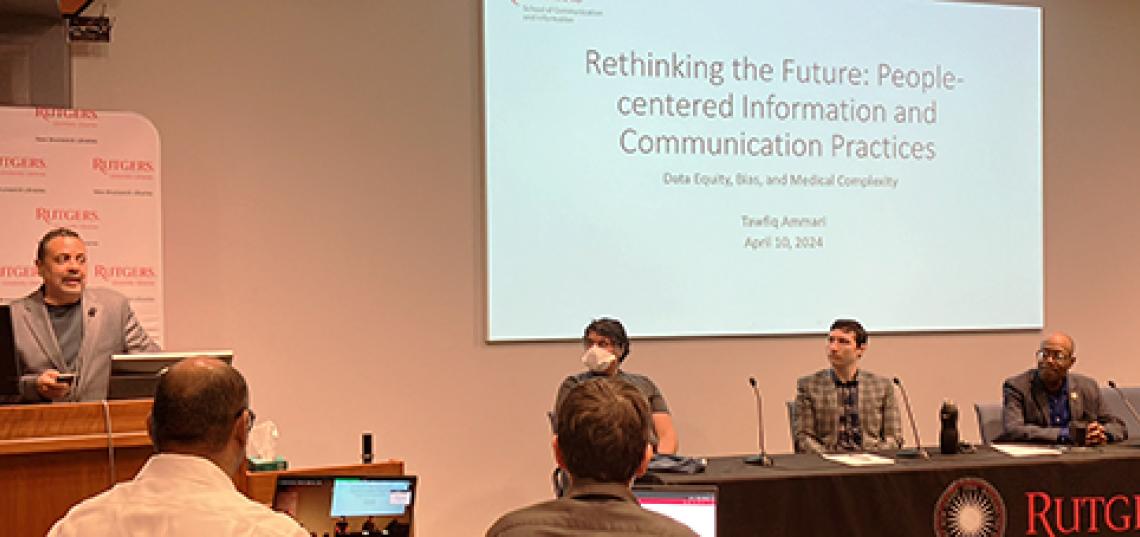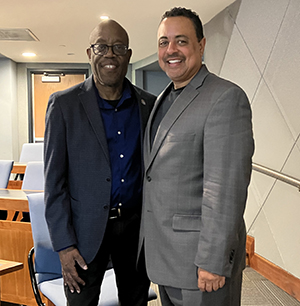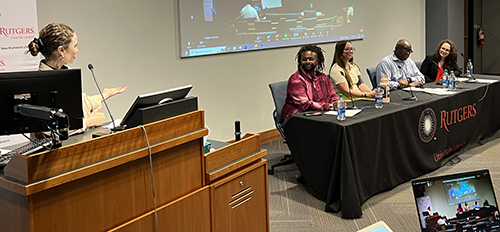
The symposium “Rethinking the Future: People-Centered Information and Communication Practices,” addressed the ways transformative, people-centered research methods can help foster and promote social change and rethink research in local communities, and aimed to develop opportunities for further collaborative interdisciplinary work around engaged research addressing re-envisioning and building information and communication infrastructure within the Library and Information Science Department, the School of Communication and Information, Rutgers University, and beyond.
Sponsored by the SC&I Library and Information Science Research Committee and held at Alexander Library on April 10, 2024, the symposium featured two panels and keynote speaker Mariame Kaba.
The event was organized by the Department of Library and Information Science Assistant Research Development committee, the event was headed by Assistant Professor Britt Paris; Associate Professor Charles Senteio; and Assistant Professors E.E. Lawrence and Kiran Garimella.
“We conceptualized this symposium as a way to get together and take up the mantle of thinking what it means to be engaged in people-centered practice, research, and advocacy around communication and information concerns in a day and age where the commons is rapidly shrinking, if it ever meaningfully existed at all,” Paris said.
“We conceptualized this symposium as a way to get together and take up the mantle of thinking what it means to be engaged in people-centered practice, research, and advocacy around communication and information concerns in a day and age where the commons is rapidly shrinking, if it ever meaningfully existed at all,” Paris said. “Part of that rethinking entails a focus on practices for re-envisioning and building information and communication infrastructure. That is the practices that people take up with increasingly technological things and how it is built by people to shape society. The experts we’ve convened have developed a power analysis grounded in their practice building power with communities in our local tri-state area around different facets of communication and information infrastructure.”
 The first panel, “Library and Information Science Engaged Research,” featured Ralph Stowe, founder of Jazz4PCA.org (Jazz for Prostate Cancer Awareness), Assistant Professor of Library and Information Science Tawfiq Ammari, and Ph.D. student Matthew Ackerman. The panelists discussed perspectives on information and communication infrastructure from the Health Humanities, Communication, and Informatics (HHCI) Working Group based at SC&I.
The first panel, “Library and Information Science Engaged Research,” featured Ralph Stowe, founder of Jazz4PCA.org (Jazz for Prostate Cancer Awareness), Assistant Professor of Library and Information Science Tawfiq Ammari, and Ph.D. student Matthew Ackerman. The panelists discussed perspectives on information and communication infrastructure from the Health Humanities, Communication, and Informatics (HHCI) Working Group based at SC&I.
The afternoon panel, “Rethinking Local Information and Communication Infrastructure,” the panelists represented a group of scholar-activists from the tri-state area, who discussed organizing around innovative local journalism endeavors. Panelists included Alison Macrina, founder and executive director of the Library Freedom Project; Rod Hicks, Editor-in-Chief of DataSourceNJ; Devren Washington, Organizing Director at the People’s Tech Project; and Cynthia Conti-Cook of the Surveillance Resistance Lab.
“The first panel focused on community engaged research, the importance of conversations, information quality, and trust as we work with sensitive issues of health and wellness in community, towards building cultures of sharing and transparency,” said Library and Information Science Department Chair and Associate Professor Rebecca Reynolds. “The second panel discussed pro-community, agential tools and technologies, and data services that are supporting people power, giving publics the awareness, tools, and bravery to challenge oppressive carceral and judicial socio-technical and information systems and increasingly privacy- and civil rights-violating data injustices.”
During the keynote, Kaba spoke of her work in libraries and building the “For the People: Leftist Library Project, whose goal is to stem the tide of activity that delegitimizes and defunds public institutions of all types, and libraries in particular.
The keynote speaker, Mariame Kaba, spoke after the second panel. Kaba is a renowned organizer, educator, archivist, curator, and activist whose work focuses on “ending violence, dismantling the prison industrial complex, transformative justice and supporting youth leadership development.” Kaba is the author and co-author of several books, including “We Do This 'Til We Free Us,” “No More Police,” and “Let This Radicalize You.”
During the keynote, Kaba spoke of her work in libraries and building the “For the People: Leftist Library Project, whose goal is to stem the tide of activity that delegitimizes and defunds public institutions of all types, and libraries in particular. This is important because libraries, while they have an imperfect past in terms of exclusion of minorities, serve as a vision to strive towards as we imagine what institutions we need to build to support the future we want.
Welcoming Kaba as the keynote speaker, Paris said, “The work Mariame does supports the fight for maintaining libraries as what ALA president and former Rutgers LIS instructor Emily Drabinski calls ‘public goods shared in common and distributed to everyone.’”
Reynolds said, “Mariame brought the energy and spirit in her moving and mobilizing presentation on libraries as public spaces, and public commons, non-commodified public goods, ‘one of the only places left, in America where we can sit for a whole day and not pay a cent.’ And therefore, in so being, are sites of politicized struggle. She spoke to the increasing need to include public libraries in organizing for social movements, and about library boards and our need to become active to preserve the democratic principles central to maintaining libraries as public goods.”
Possible outcomes of the event, Paris said, include building out research communities around transformative methodologies; foregrounding power analyses; and re-imagining how information and communication systems could work within those frames.
Learn more about the Library and Information Science Department at the Rutgers School of Communication on the website.
Photo captions: Top: panel 1; middle: Associate Professor Charles Senteio and Ralph Stowe; panel 2.
